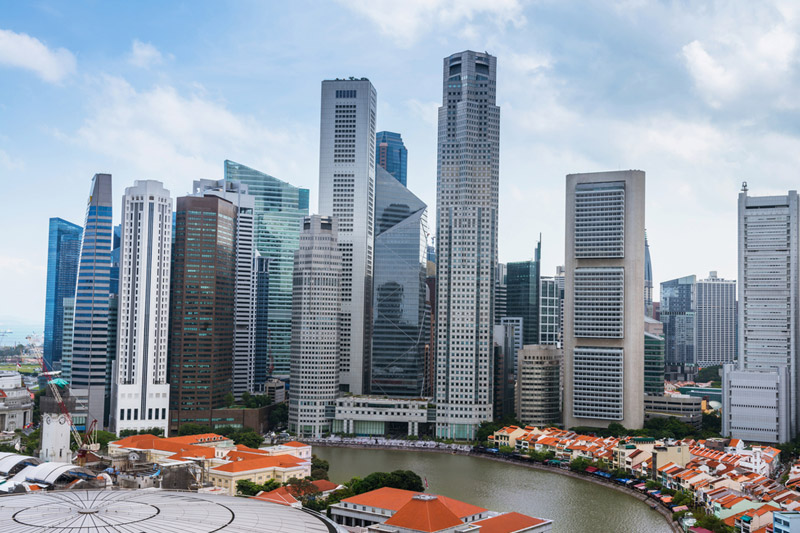(Bloomberg) -- Singapore property and bank stocks led declines on the benchmark stock index Friday after the government unexpectedly tightened property curbs to cool a market the central bank described as euphoric. City Developments Ltd. and UOL Group Ltd. fell more than 14 percent each.
The index tracking property stocks dropped 1.4 percent as of 9:02 a.m. in Singapore Friday, set for the lowest close in more than 15 months. It had risen the most in two weeks Thursday despite a warning from the central bank chief the previous day that there was "a euphoria" in the housing market. Bank shares also fell.
“It’s definitely a signal by the government that they are serious about managing the property market,” said Joel Ng, an analyst at KGI Securities (Singapore) Pte.
City Developments Ltd. fell 15 percent to S$9.59 a share as of 9:06 a.m. UOL Group Ltd. slid 14 percent to S$6.65. Oxley Holdings Ltd. plunged 15 percent, and stocks including CapitaLand Ltd., SingHaiyi Group Ltd., Keppel Land owner Keppel Corp. and Wing Tai Holdings Ltd. also declined. Many of these are among developers that have added significantly to their Singapore residential landbank, according to KGI.
Far-reaching
The announcement late Thursday of higher stamp duty rates and tougher loan-to-value limits for buyers surprised investors, who had pushed shares of property developers’ higher.
"The policy measures are far-reaching rather than surgical in nature," Citigroup (NYSE:C) analyst Si Xian Goh wrote in a note. "That first-time home buyers were included in the policy dragnet, however, does suggest that the regulators are concerned that some first-time buyers are buying out of a fear of missing out and contributing to the overall spate of exuberance."
Individuals taking up their first housing loan will face tighter borrowing limits under the new rules, meaning they have to put up more cash to buy property.
For foreign purchases of residential property, the additional buyers stamp duty increases to 20 percent from 15 percent, while for Singapore citizens the rate increases apply only from their second purchase, the Monetary Authority of Singapore, Ministry of National Development, and Ministry of Finance said in a joint statement Thursday.
For entities buying any residential properties for development, the additional buyers stamp duty rises by 10 percentage points to 25 percent, with a further five percentage points imposed for developers.
Adjustments to ABSD Rates for Residential Property
DBS Group Holdings Ltd., Southeast Asia’s biggest lender, fell 2 percent to S$25.49. Oversea-Chinese Banking Corp. slid 1.4 percent to S$11.34. United Overseas Bank Ltd. dropped 1.6 percent to S$26.66.
"The newly announced measures are likely to have some near-term negative impacton sentiment toward the Singapore banks, although we still see a bright outlookahead driven by higher margins given the rising rates environment and stronggrowth in wealth management," Goldman Sachs (NYSE:GS) analysts Melissa Kuang and Max Jelatianranat wrote in a note. The new measures "could still dampen the recent pick up in mortgage growth momentum."
Price Pressure
An index tracking private residential prices jumped 3.4 percent in the three months ended June 30, according to a flash estimate from the Urban Redevelopment Authority this week. That builds on a 3.9 percent gain in the first quarter, which was the biggest since the second quarter of 2010.
The rebound in home prices has prompted aggressive land bids from developers. The government in February raised taxes on home purchases exceeding S$1 million as collective apartment sales reached levels the central bank described as exuberant. The so-called en-bloc sales are where a group of owners band together to sell entire apartment buildings. Singapore home sales jumped to the highest in nine months in May as developers sold 1,121 units.
